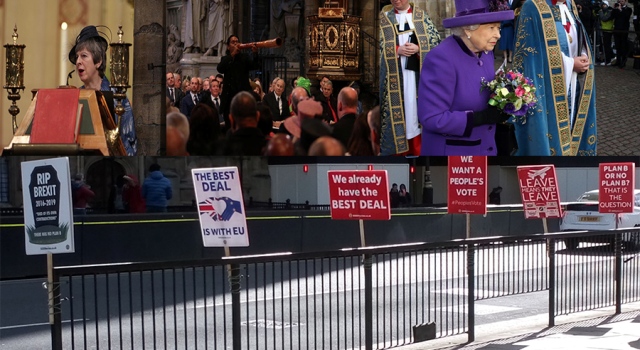 Above: Theresa May, William Barton and the Queen [Photos: Westminster Abbey]. Below: Brexit and pro-Europe placards on St Margaret St [photo: Debbie Ransome]
Above: Theresa May, William Barton and the Queen [Photos: Westminster Abbey]. Below: Brexit and pro-Europe placards on St Margaret St [photo: Debbie Ransome]
The 2019 theme of #AConnectedCommonwealth seemed mildly out of synch with the scene around Westminster Abbey on Commonwealth Day.
You couldn’t help but see the Brexit placards to one side and “Keep us in the EU” placards to the other. However, the protests went much further than this as at least half a dozen sets of placard-waving groups, highlighting grievances about taxis, minicabs and education funding, all had their day in the cold March sunshine on 11 March.
Inside Westminster Abbey, there was the complete opposite of this in the calm and order during the preparations for the afternoon Commonwealth Service – A Celebration of the Commonwealth.
For the day, I was attached to the BBC World Service’s commentary team which allowed me access to the Abbey and a bird’s eye view of the preparations and the Service itself. Even within the security of the BBC outside broadcast area on the side of the Abbey, you could still hear the Brexit/ pro-Europe protests on taking off your headphones.
This was in stark contrast to the sense of inclusiveness and excitement on the part of the schoolchildren and performers who rehearsed at the Abbey a few hours before the service.
Strong climate change message
Within the Abbey enclave, the major themes of connectivity and tackling climate change won the day.
In one of the most powerful deliveries of the Service, endurance swimmer and ocean advocate, Lewis Pugh, described in his Reflection how, in his 32-year swimming career, he had felt the waters on the edge of the Arctic rise from 3° Centigrade to 10° Centigrade. The South African UN Patron of the Oceans said in an impassioned speech at the Service that this was a crucial moment in the history of the planet and that he believed that “the Commonwealth is uniquely placed to solve this crisis”.
In a one-hour Service punctuated by musical interludes, there was another reminder of the need to treat the planet with respect from the performance on the didgeridoo by Australian instrumentalist and composer William Barton. His walk down the nave of the Abbey playing Kalkadungu’s Journey – a haunting sound of an ancient world – delighted the younger royals and all the younger members of the 2,000-strong congregation.
So too did Grammy award-winning band Clean Bandit, which performed Symphony, clearly chosen for its “connected” theme with the words, “I just want to be part of your symphony”.
The climate change and connectivity messages returned in the multi-faith prayers. Rabbi Debbie Young-Somers spoke of “connectedness and, through it, [the ability] to repair the damage we have done”. The Shia Muslim representative, Maulana Sayed Ali Abbas Razawi, gave thanks for “this beautiful world, for the land and sea, for the gift of its resources”. The Roman Catholic representative, Father Daniel Humphreys, made note of “the value of mutual love and respect”.
Mother of all networks
That message of love and respect could be found in heavy doses inside the Abbey before, during and after the ceremony. Only the tired looks of UK Prime Minister Theresa May, who delivered the Reading, reminded the congregation of the turmoil outside.
The Commonwealth Secretary-General, Patricia Scotland, who delivered the Act of Affirmation to the Commonwealth, had earlier in the day had the chance to speak more freely on Commonwealth values during a BBC Radio 4 interview.
The Service had done its annual job of showcasing the diversity of the Commonwealth, with a visual and audio journey through its cultural mix.
The Queen, whose arrival had caused the entire Abbey to perk up, remained the mother figure of what Lord Howell has called “the mother of all networks” in his latest book on the Commonwealth.
As the Royal party left and people lined up for photos with their respective flag bearers and favourite celebrities, the noise of the various protests on the roads flanking the Abbey began to die down.
Outside Westminster station, two Americans had asked what all the fuss was about and why Britain had so many flags. I explained to them that these were the flags of the 53 members of the Commonwealth. One of the visitors said to his friend that this indicated that Britain had lots of people to trade with when they “step out of Europe”.
One former Australian Prime Minister might not have agreed with my two American visitors.
In an article for the Guardian which appeared on Commonwealth Day, Kevin Rudd vigorously dismissed any ideas that trade with Australia, Canada, New Zealand and India would provide “magical alternatives to Britain’s current trade and investment relationship with the European Union”.
He wrote: “Much as any Australian, Canadian and New Zealand governments of whichever persuasion would do whatever they could to frame new free-trade agreements with the UK, the bottom line is that 65 million of us do not come within a bull’s roar of Britain’s adjacent market of 450 million Europeans.”
Debbie Ransome is the Website Editor for The Round Table. She formerly worked for the BBC.
Related links
The Commonwealth Service – Westminster Abbey
Commonwealth Day Abbey Service broadcast to millions around globe – Commonwealth Secretariat
A Connected Commonwealth – BBC World Service live coverage of the Commonwealth Day Service
The Commonwealth at 70 – The best of Radio 4’s Today programme
The mother of all networks: Britain and the Commonwealth in the 21st century – Sir Peter Marshall reviews Lord Howell’s book for the Round Table
Think the Commonwealth can save Brexit Britain? That’s utter delusion – Kevin Rudd, The Guardian
More about the Commonwealth Round Table– Wikipedia



